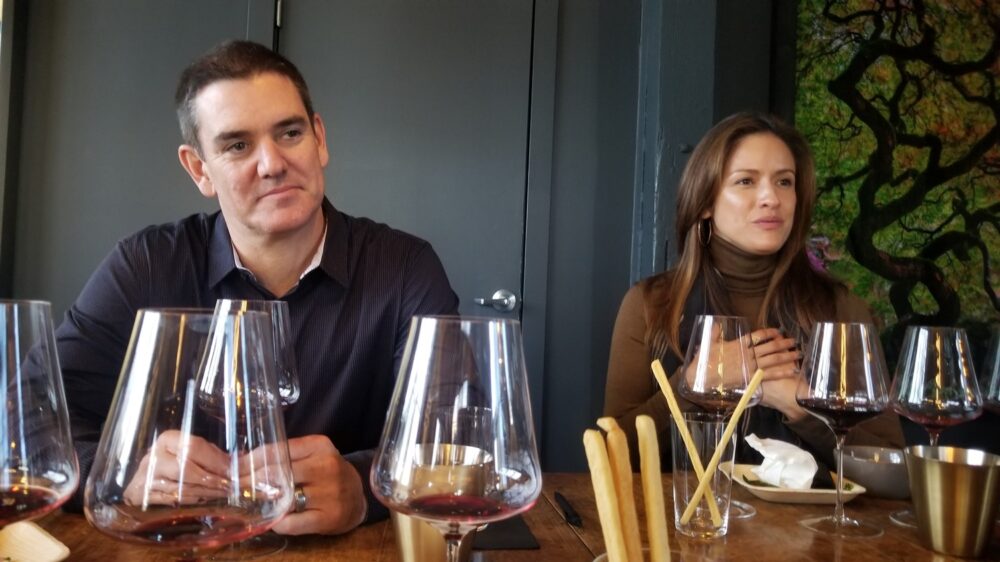
“You honestly never know what failure a success is going to need.”
– Hayes Drumwright, Vida Valiente
Not everyone in the Napa Valley with a showcase wine brand comes from money. Some winery owners grew up in impoverished households, amassing their wealth much later in life. I’m intrigued by these types of folks. Not because I think they’re exceptional for having turned things around. I don’t equate having lots of money with success. I’m more intrigued by the choices some of them make; the way they choose to give back, if at all. When someone who came from poverty does so, it often hits in a different way. Enter Hayes and Susana Cueva Drumwright and their Vida Valiente wine brand.

Hayes and Susana Cueva Drumwright
The wines of Vida Valiente are well-known among the wine cognoscenti. They’re widely considered to be fine wines and are made by the highly regarded winemaker Sam Kaplan. Unlike other high-profile producers for which Kaplan is a consultant (Arkenstone, Maxem, Vangone, Memento Mori), he’s got a lot of skin in the game at Vida Valiente; he and his wife Nancy, a Michelin-star chef, are partners in the venture.
At the center of the Vida Valiente wine brand is the Vida Valiente Foundation. Founded in 2019 by the Drumwrights and the Kaplans, Vida Valiente and the foundation came to fruition at the same time. Vida Valiente’s flagship wine is The Movement. One hundred dollars of each $250 bottle of The Movement sold benefits the Vida Valiente Foundation. Often, the quality of charitable wines is an after-thought. The Movement shatters that paradigm and is brightly pretty, balanced, and texturally riveting.
The foundation funds last-dollar scholarships for first-generation students from low-income backgrounds attending Stanford University. Additionally, the forty or so students the foundation supports annually also receive mentorships and an impressive infrastructure, with an emphasis on networking. Students are partnered with captains of industry across disciplines, advising them and providing guidance every step of the way.
Ninety percent of first-generation low-income students in the United States take over six years to graduate, with 33% dropping out after three years. The challenges these young people face – from imposter syndrome to a profound lack of financial and emotional resources to a paucity of like-minded fellow students with whom to build a community – are extremely hard to overcome. To date, 119 scholars, now in their third year, continue to blossom with the help of the foundation.
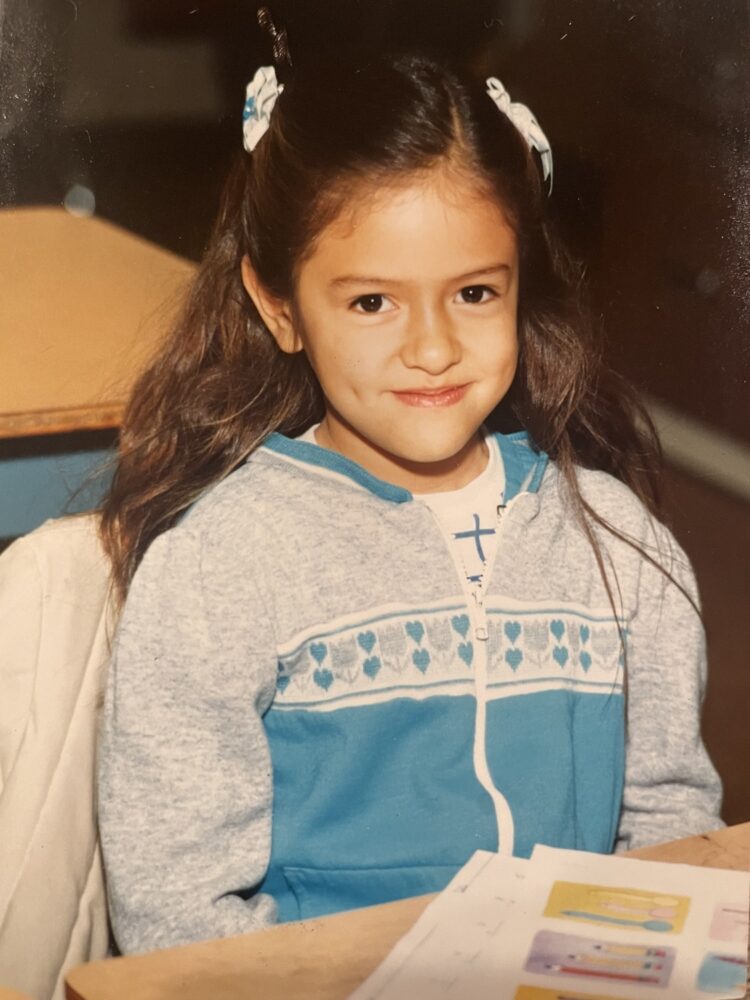
Susana as a child
“I’m first-generation, low-income,” Susana Drumwright tells me. “My parents immigrated here from Latin America. My mom was Guatemalan, and my dad was Mexican. My mom was sent here as a young girl. She was the oldest of three living in poverty in Guatemala.” Susana’s mother, Julia, was sent to the United States when she was just 16 years old. A family friend met her at the airport. She would have to not only survive, but thrive, for she was expected to send money back home. “I can’t imagine sending my kid to a foreign country with no support system,” she says. “Luckily, she landed a job as a housekeeper and nanny for an affluent family in Encino, the Lowes. Mrs. Lowe took my mom under her wing. She became this unassuming mother figure. Taught her how to drive. Helped her get back into school. Get her driver’s license. My mom would buy the newspaper in English and try to read it, just to better herself and her situation. She worked very hard and took advantage of the opportunities afforded her. So, I was very driven growing up. I wanted to help my parents. When I was in junior high, my parents got divorced. It was a violent end to a tumultuous relationship. They were not good together. Amazing parents, but not good together.”
I’m meeting up with the Drumwrights in an old section of Napa where the old Sawyer’s Tannery used to be. Though their Vida Valiente tasting room is elegant and well-appointed, the location serves a working-class community. There’s a liquor store and baseball field across the way, but no fancy restaurants or other tasting rooms in the area.
I’ve caught Susana on a tough day. Her mother, Julia, whose life and tenacious spirit informed the creation of the Vida Valiente Foundation, died not long ago due to complications from Covid, and re-counting her mom’s immigrant story, she’s raw and vulnerable, asking for some time to compose herself after sharing a story of a wig shopping excursion she undertook with her mom, who had gotten sick again after going into remission for some time.
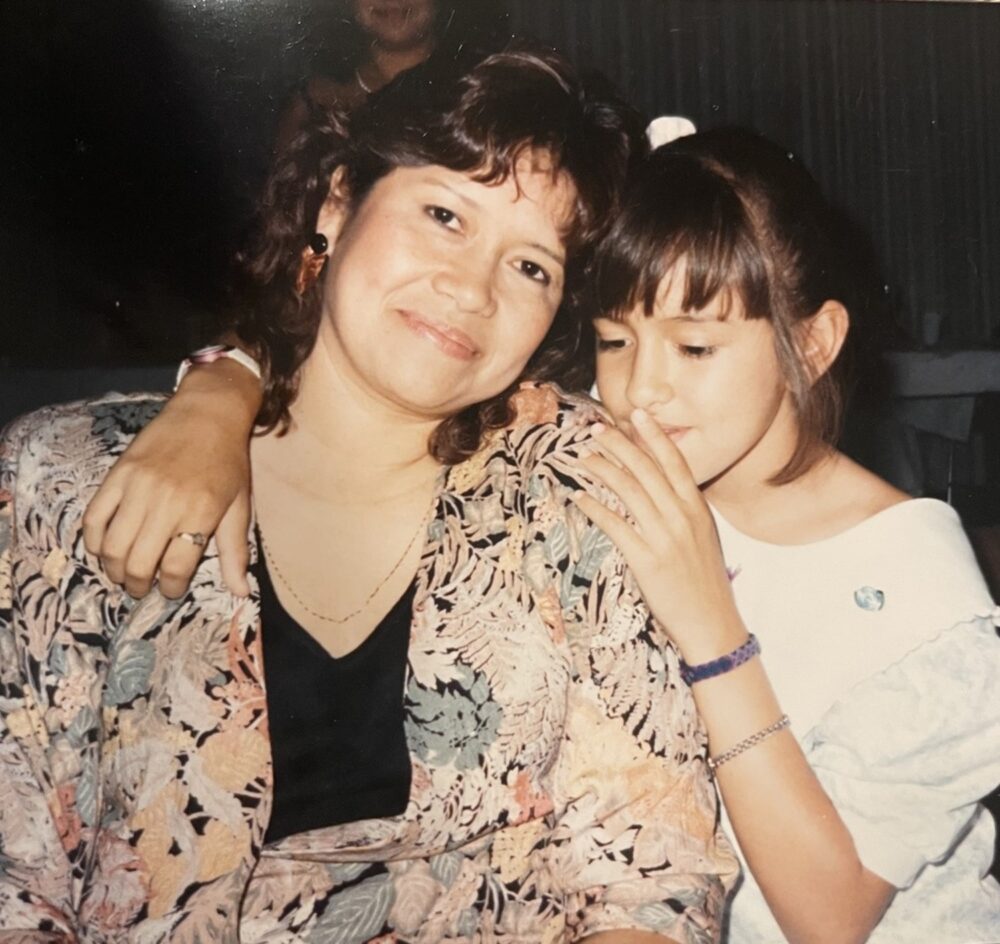
Susana with her mom Julia
“One of my core memories from that time is that her disability ran out, so she had to go back to work. Before she went back to work, we went to the wig shop. In the morning, I was helping her get dressed. I could feel her sadness, but she always put on a strong front. She said, ‘Don’t be sad for me.’ She always worked so hard and then she got sick again. She was my hero. She was the one I looked up to. She would always say to me in Spanish, ‘Mija, tienes que ser valiente. You must be brave. You must get through this. It will make you stronger.’ That always stuck with me; bravery, not just for the purposes of being tough, but for the sake of persevering and growing.”
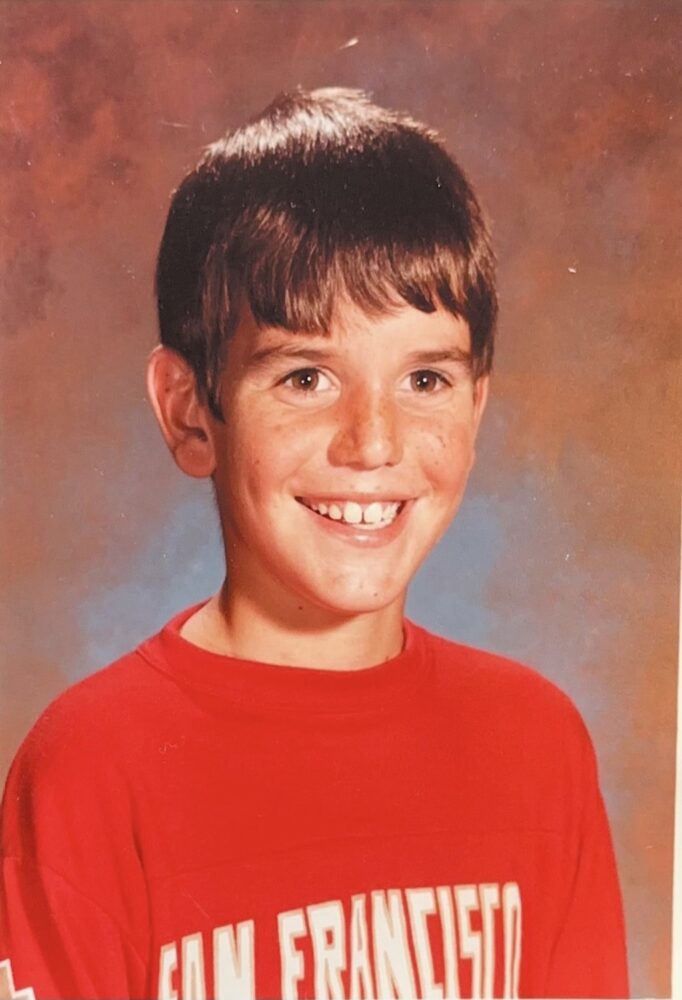
Young Hayes Drumwright
Hayes Drumwright is an entrepreneur and comic book fan. He grew up in a tough household, plagued with poverty, occasional violence, and mental illness. He was raised by a single mom, and though he privately shares some heart-wrenching stories off the record, he’s careful with his words. The eldest of three siblings, Hayes was 11 years old when his parents got divorced. He was suddenly thrust into a quasi-parental role, taking care of his 7- and 9-year-old siblings from 6:00 pm to 6:00 am while his mother, having returned to work after the divorce, worked the graveyard shift as a nurse. “That was difficult for me, but when I hear the stories from these kids (the scholarship recipients), mine doesn’t seem all that difficult. I’m the least relatable guy in the room, because I’m a white successful guy, but we all do start somewhere, and my start wasn’t that great.”
Sitting across from me, he illustrates his point by raising his two hands. He uses the story of Batman and the Joker to make his point. On the one hand, he tells me, there’s the Joker. The Joker says, “I’ve suffered so much and been treated so terribly, I want others to feel the same way, to feel my pain and misery.” Hayes holds up the other hand. “Batman says, ‘I’ve suffered so much and life has treated me so badly that I never want anyone to have to go what I went through, to have to feel that level of pain.’ Which one do you choose?” he asks rhetorically.
“My background has given me a high E.Q. I like to get to know people. That’s what really attracted me to Susana. I knew how bright and smart she was, but when she started sharing her background with me about a year after we started hanging out, I became so enamored by her; by someone who went through so much and is still so strong.”
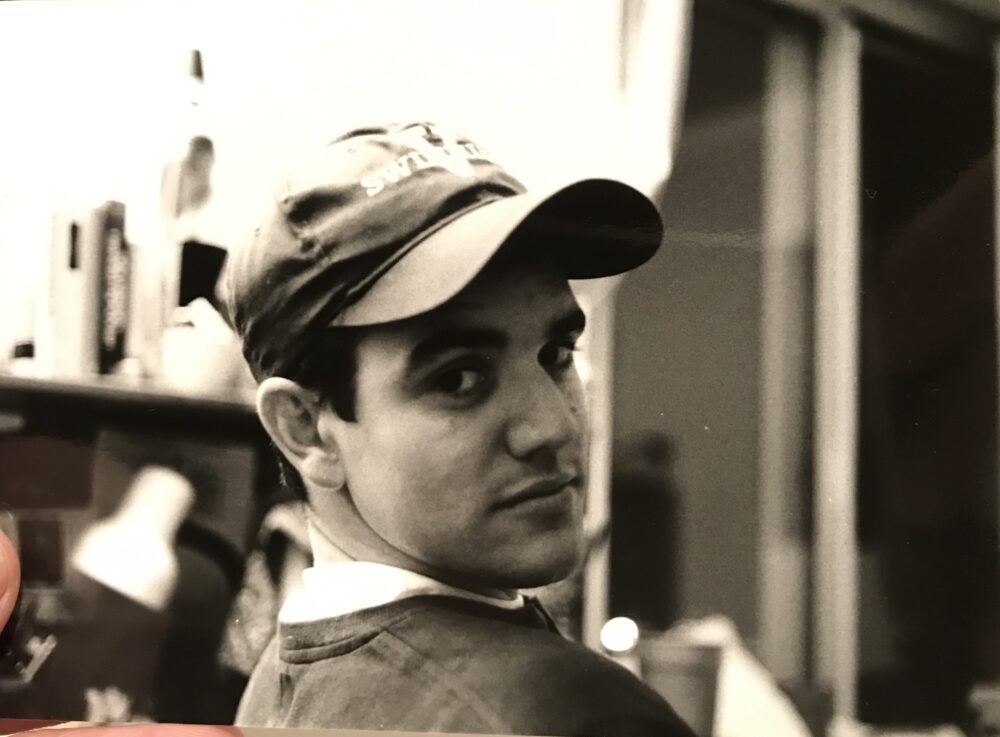
Hayes in college
Hayes swam through college, but when he was 20, he was diagnosed with testicular cancer. “I often say that getting cancer was the best thing that happened to me. It happened at a time when I thought I was invincible.” Initially, he was told that he’d have to quit swimming, quit college, go into treatment. But his tumor grew so quickly that it ended up cutting off its own blood supply and killed itself. Nothing had spread. Still, for five years, he had monthly scans and blood tests to ensure he was out of the woods.
After finding out he was okay, he realized there was no reason to fear failure or embarrassment. “In my twenties, I failed a ton. I had two or three startups.” He accomplished a long-held dream to become a millionaire by the time he was 30. He beat his goal and became a millionaire at 29 years old. “In my mind, the reason my mother suffered so much, and that we suffered so much, was because we didn’t have money. She worked nights and the landlord would come and try to kick us out. My brain translated that as ‘we just needed more money.’ I didn’t know at the time that my dad was sending money every month.” There were other domestic issues at play that Hayes wasn’t aware of when he was younger. He’s hesitant to share details, though. “My mother is still alive. I don’t want to hurt her feelings.”
He jokes now that his goal should have been to stay a millionaire. Instead, he was bankrupt by the time he was 30 years old. “That was an interesting time in my life. I figured it out that all that failure was okay. You honestly never know what failure a success is going to need.” After the bankruptcy, he set up rules for the next company he had. What would be allowed and what wouldn’t be allowed. “It would be my job as CEO to make sure that everyone was protected. I took this ‘secure my family’ mantra that I had in my head and applied it to the entire organization I was planning.” He has had tremendous financial success since then and also co-owns the Memento Mori wine brand along with his childhood friends Adriel Lares and Adam Craun.
As we chat, we sip on The Movement, the core enological representative of the foundation. “We really are trying to create an amazing wine that also ties our clients to an amazing journey that is tangible. It’s not just a story about something that happened in the past. They can get involved in the movement,” Hayes says. To date, many of their buyers have volunteered to mentor and assist the students after buying The Movement. “If you have empathy in your heart and you want to give back and you’ve accomplished certain things, I think the foundation gives you an opportunity to give back in a meaningful way,” Susana adds.

The Movement packaging is striking. The etched image represents peaks and valleys. “Don’t get too low in the lows, or too high in the highs,” Susana says. The peak and valley are not symmetrical. “We wanted it to look like a curvy bridge that’s super unstable in its footing. A valiant journey is not easy. It’s not a cake walk. If you get too stuck in the highs and become arrogant, you’re going to lose. And if you get too low, you’re never going to have a chance to win. So, persevere, don’t get angry. Just stick with it,” she adds.
These are strange times we’re living in, rife with division, fear, and negativity. It appears, however, that the Drumwrights didn’t get that memo. “There’s so much good in the world,” Susana tells me as we begin to wrap things up. Hayes interjects enthusiastically, adding, “There is! There really is! People naturally want to be good. I believe that. I really do,” he says.

